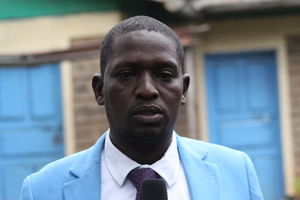
Amos Rono gestures during the interview at his home in Bomet.
Many readers have asked why the Nation gave so much publicity to Amos Rono, the Bomet groom whose wedding to Nelly Chepkoech was called off in the last-minute on December 8. The Nation, and other media, subsequently gave him so much publicity that he became an instant celebrity, sought after by corporate marketers, admirers and supporters.
If the wedding had not been called off, Nation readers wouldn’t have known about it. Now that it was, it has become national news. In general, if an event is unusual or out of the ordinary, it’s news. As the old journalism cliché says, if a dog bites a man that is not news but if a man bites a dog it is news.
But this is not a simple man-bites-dog affair. We need to ask, as Nation readers have, did Mr Rono deserve all that publicity while his would-be bride, who was trying to play catch-up, was portrayed as the villain of the piece?
The following Nation headlines tell it all: “It’s over! Declares Amos, the Bomet bridegroom”, “Amos Rono, whose wedding was cancelled in Bomet by his bride Nelly, finally speaks”, “Bomet groom: I’ll be available for new love after 4 months” and “Groom in failed Bomet wedding off to Mombasa to cool off, heal”.
Did the Rono version of the story justify all that publicity at the expense of other news? Did the Nation uncritically allow Mr Rono to acquire celebrity status and rubbish Ms Chepkoech’s claims? Was there equality of arms in the presentation of the stories?
It wasn’t lost to readers that Mr Rono controlled the flow of information while Ms Chepkoech was always behind, reacting to claims by Mr Rono. It was not lost to readers that Mr Rono earned himself, for his trouble, a free holiday to the Coast from a travel agency that piggybacked on his new-found fame. But what readers actually wanted to know is the criteria Nation uses in giving publicity to such matters.
Editors are generally guided by the newsworthiness and importance of a story as well as what readers are interested in. Things that make a story newsworthy include its impact or how the story will affect audiences, proximity to the audiences, timeliness, prominence of the people involved in the news story, conflict or potential conflict in the story, human interest in the story, how novel or odd the information is and so on.
In this particular case, the cancellation of a wedding must be newsworthy, especially when it is accompanied by conflict and human interest. However, research that is more than 10 years old shows that at least 28,000 couples get married in Kenya every year (“Wealthy Kenyans sink Sh40bn into weddings”—Nation.Africa, October 24, 2009). But only a fraction of those gets reported because the media doesn’t routinely report nuptials as news, important as they are to the couples and their families.
Rudely interrupted
But it has not always been that way. Way back when journalism in Kenya was simple, uncompetitive and unsophisticated, the media routinely reported news of people getting married. Today, weddings are reported as news only if the parties or their parents are famous or famous people attend the ceremony. Or if the wedding is dramatically called off or rudely interrupted. And even then, the threshold is high.
Calling off a wedding is not a rare occurrence. People do it for a variety of reasons—including a nagging suspicion that it was not the right decision, parental pressure, sexual betrayal and other discoveries. Anecdotal evidence suggests that 20 out of 100 planned weddings are, in fact, called off without any public fuss. Only when the reasons for the cancellation are unexpected, sudden and dramatic should the media treat them as headline news.
The following Nation headlines indicate the kind of reasons that can turn an ordinary story of the cancellation of a wedding into a news story: “Wedding cancelled after man claims he fathered bride and groom”, “Tana River church suspends wedding after couple confesses to ‘fornication” and “Wedding called off over certificate hitch”.
The NMG editorial policy says all editorial content must justify the space they occupy. There is no room for content that only takes up valuable space that could be better dedicated to more edifying issues.
The Public Editor is an independent news ombudsman who handles readers’ complaints on editorial matters including accuracy and journalistic standards. Email: [email protected]. Call or text 0721989264.










